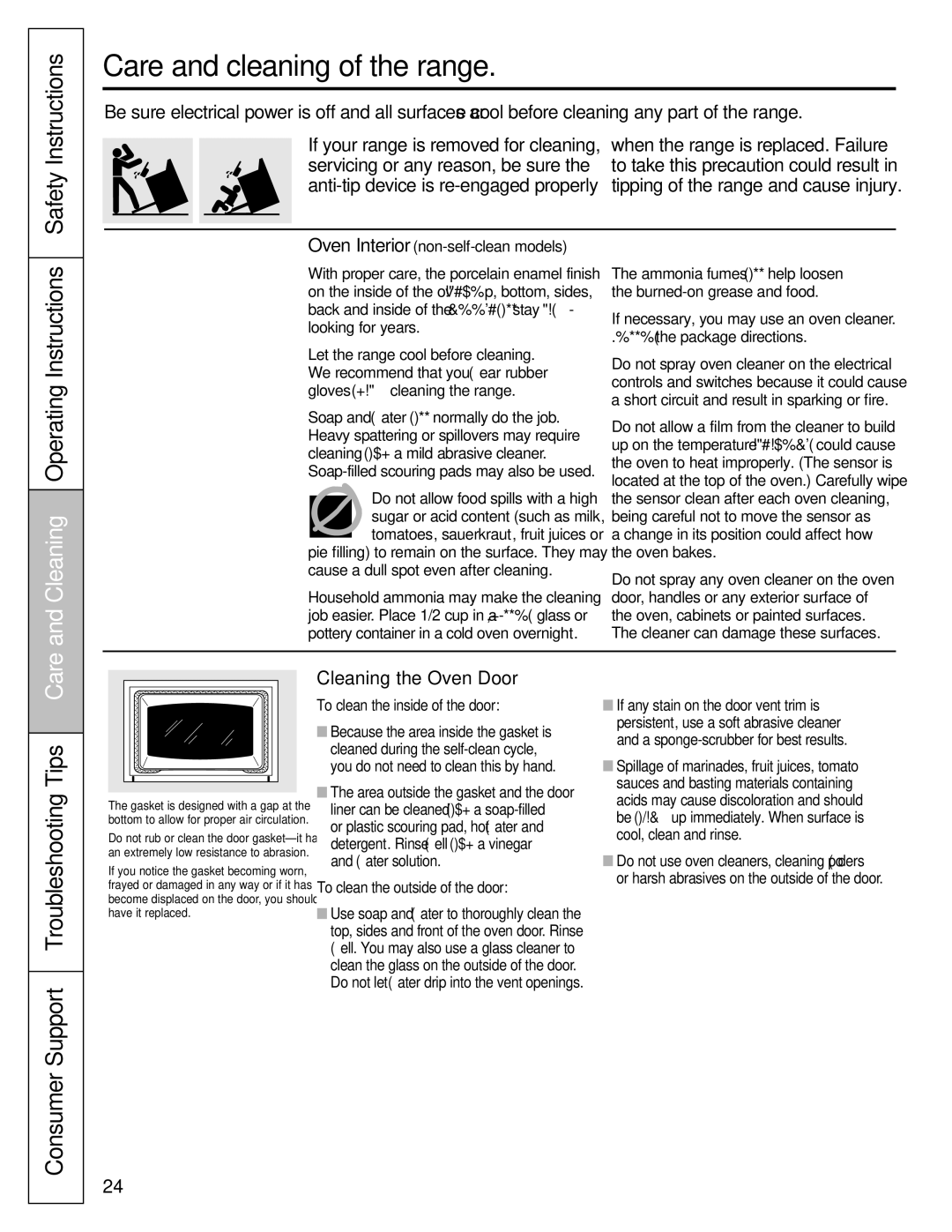
Safety Instructions
Care and cleaning of the range.
Be sure electrical power is off and all surfaces are cool before cleaning any part of the range.
|
| If your range is removed for cleaning, | when the range is replaced. Failure |
|
| servicing or any reason, be sure the | to take this precaution could result in |
|
| tipping of the range and cause injury. | |
|
|
|
|
|
|
|
|
|
| Oven Interior |
|
and Cleaning Operating Instructions
With proper care, the porcelain enamel finish on the inside of the ov!"#$%p, bottom, sides, back and inside of the &%%'#()** stay "!(- looking for years.
Let the range cool before cleaning. We recommend that you (ear rubber gloves (+!" cleaning the range.
Soap and (ater ()** normally do the job. Heavy spattering or spillovers may require cleaning ()$+ a mild abrasive cleaner.
Do not allow food spills with a high sugar or acid content (such as milk, tomatoes, sauerkraut, fruit juices or pie filling) to remain on the surface. They may
cause a dull spot even after cleaning.
Household ammonia may make the cleaning job easier. Place 1/2 cup in a ,+-**%( glass or pottery container in a cold oven overnight.
The ammonia fumes ()** help loosen the
If necessary, you may use an oven cleaner.
.%**%( the package directions.
Do not spray oven cleaner on the electrical controls and switches because it could cause a short circuit and result in sparking or fire.
Do not allow a film from the cleaner to build up on the temperature !"#!$%&'( could cause the oven to heat improperly. (The sensor is located at the top of the oven.) Carefully wipe the sensor clean after each oven cleaning, being careful not to move the sensor as
a change in its position could affect how the oven bakes.
Do not spray any oven cleaner on the oven door, handles or any exterior surface of the oven, cabinets or painted surfaces. The cleaner can damage these surfaces.
Consumer Support Troubleshooting Tips Care
The gasket is designed with a gap at the bottom to allow for proper air circulation.
Do not rub or clean the door
If you notice the gasket becoming worn, frayed or damaged in any way or if it has become displaced on the door, you should have it replaced.
Cleaning the Oven Door
To clean the inside of the door:
![]() Because the area inside the gasket is cleaned during the
Because the area inside the gasket is cleaned during the
![]() The area outside the gasket and the door liner can be cleaned ()$+ a
The area outside the gasket and the door liner can be cleaned ()$+ a
To clean the outside of the door:
![]() Use soap and (ater to thoroughly clean the top, sides and front of the oven door. Rinse (ell. You may also use a glass cleaner to clean the glass on the outside of the door. Do not let (ater drip into the vent openings.
Use soap and (ater to thoroughly clean the top, sides and front of the oven door. Rinse (ell. You may also use a glass cleaner to clean the glass on the outside of the door. Do not let (ater drip into the vent openings.
![]() If any stain on the door vent trim is persistent, use a soft abrasive cleaner and a
If any stain on the door vent trim is persistent, use a soft abrasive cleaner and a
![]() Spillage of marinades, fruit juices, tomato sauces and basting materials containing acids may cause discoloration and should be ()/!& up immediately. When surface is cool, clean and rinse.
Spillage of marinades, fruit juices, tomato sauces and basting materials containing acids may cause discoloration and should be ()/!& up immediately. When surface is cool, clean and rinse.
![]() Do not use oven cleaners, cleaning po(ders or harsh abrasives on the outside of the door.
Do not use oven cleaners, cleaning po(ders or harsh abrasives on the outside of the door.
24
